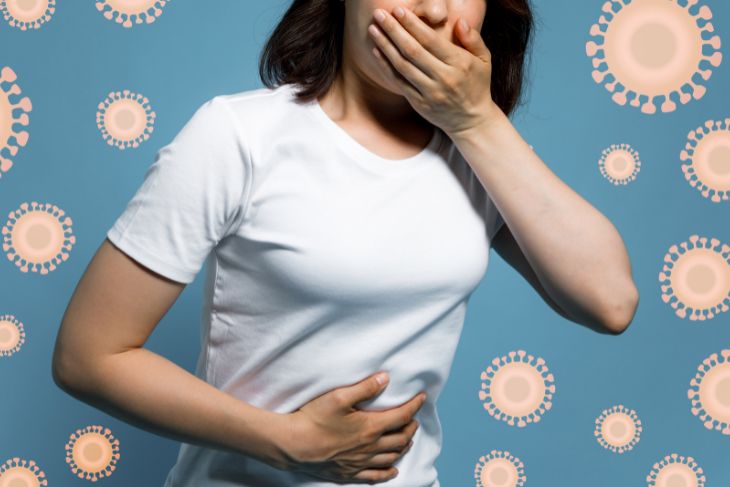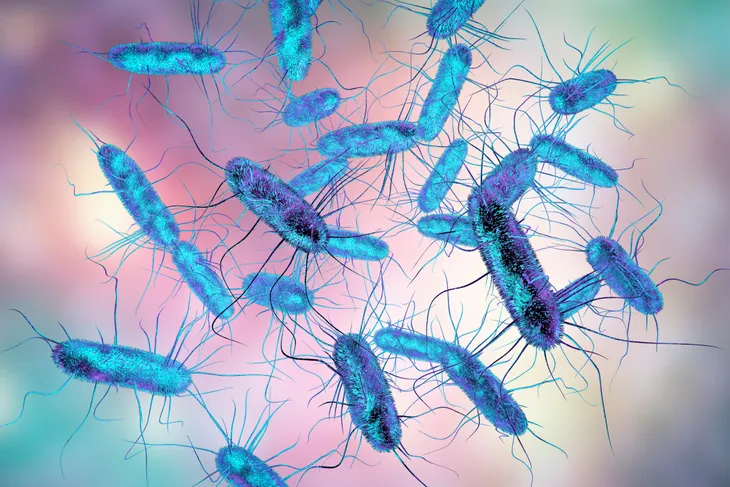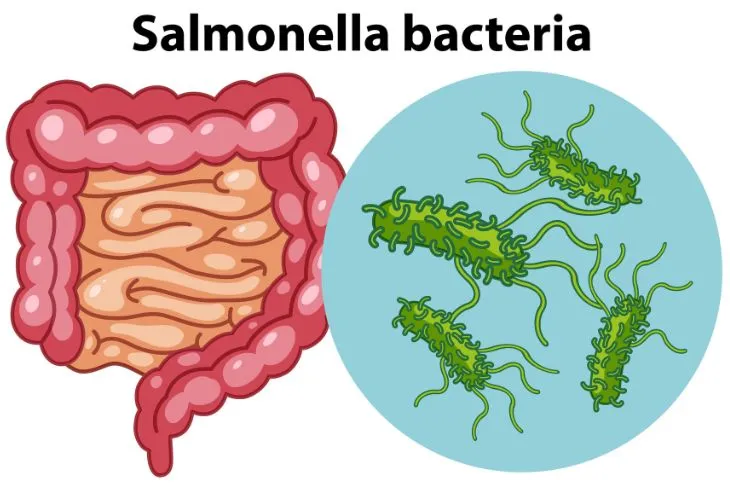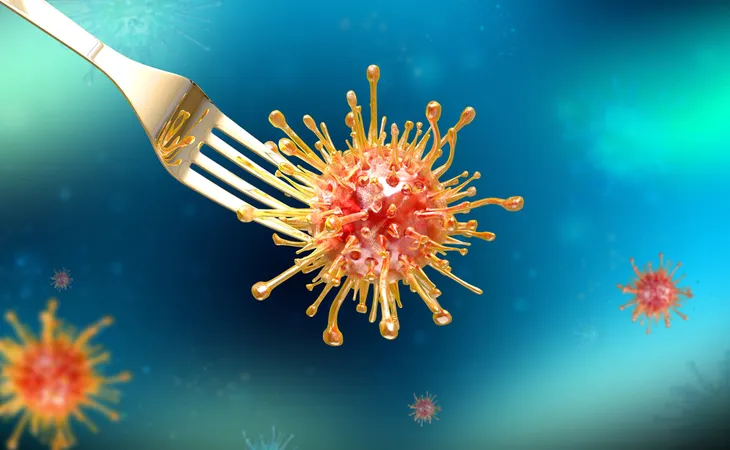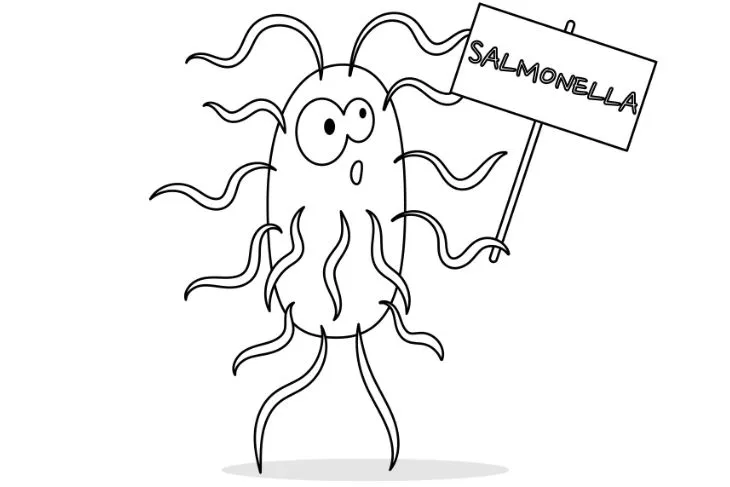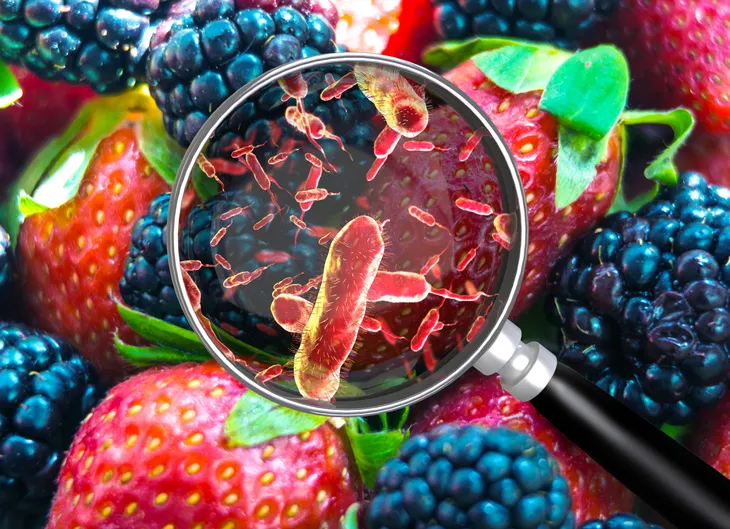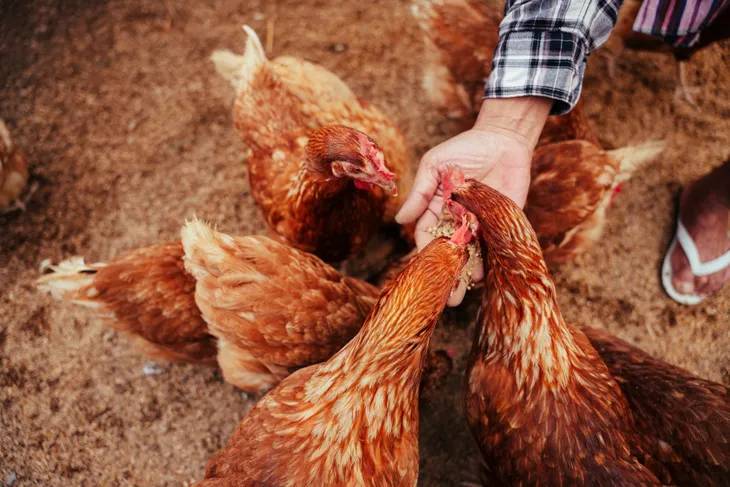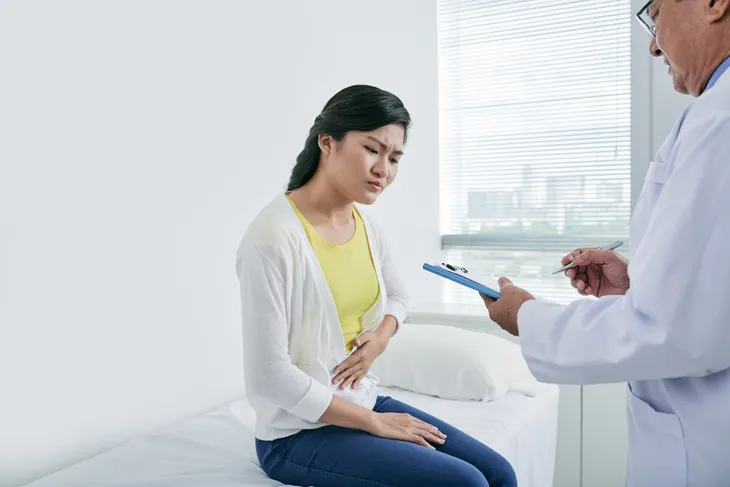- Salmonella infection (salmonellosis) is a common bacterial disease spread through contaminated food and water.
- The most common symptoms are diarrhea, fever, headache, upset stomach, vomiting, and abdominal cramping.
- Most people fully recover on their own within 4 to 7 days. Treatment includes rest with lots of fluids, and in some cases antibiotics.
- Some prevention tips are to avoid raw foods, wash foods, keep kitchen surfaces clean, and wash your hands regularly.
If you haven’t experienced salmonella food poisoning first hand, you’ve likely heard of it. That’s because salmonella is one of the most common types of food poisoning in the U.S. Anyone who has experienced it can attest that it is not a nice thing to go through. While some people have no symptoms, it often results in diarrhea, fever, and painful stomach cramps, notes the Mayo Clinic.
Salmonella infection (salmonellosis) is a common bacterial disease that affects the intestinal tract. People often become infected with salmonella after coming into contact with contaminated food or water. Pet reptiles and amphibians can also transmit salmonella. We discuss the key signs and symptoms to watch for, what causes it, as well as how to treat and prevent it.
What is Salmonella?
Salmonella develops from the bacteria salmonella which causes humans to become ill. There are over 2,500 subtypes of salmonella, including human and animal strains, says Medical News Today. Luckily, fewer than 100 of these strains of salmonella bacteria will infect people.
WebMD notes that salmonella (officially called salmonellosis) is the bacteria responsible for the majority of all the food poisoning cases reported in the U.S. This strain of salmonella often results in an upset stomach, diarrhea, fever, and abdominal pain, warns the source. Most people recover in 4 to 7 days.
What Happens When a Person Gets Salmonella?
When a person becomes infected with salmonella, it means they’ve come into contact with the bacteria at some point in the previous six days. Symptoms can appear as early as 6-hours after an infection, but can also take up to six days, according to the Centers for Disease Control and Prevention (CDC). Once they become sick, it means the bacteria has gotten past their stomach acid and immune system.
“Salmonella bacteria invade and destroy the cells that line your intestines,” writes the Cleveland Clinic. “This makes it hard for your body to absorb water, which can give you stomach cramps.” Water leaves the body in the form of diarrhea, one of the most common symptoms of salmonella.
How is Salmonella Spread?
Salmonella can spread a number of different ways. One of the most common is through food. If a person eats food contaminated by the feces of an infected animal or person, or by drinking contaminated water, they will get sick with a salmonella infection, explains Ontario’s Ministry of Health. People usually get sick with salmonella food poisoning after eating raw or prepared foods that have been handled by other people, adds Healthline.
It can also spread from person-to-person an infected person or someone who’s come in contact with salmonella does not wash their hands properly. “Proper hand washing and safe food handling are key to preventing food-borne illnesses such as Salmonellosis,” writes the source.
How Common is Salmonella?
Unfortunately, salmonella infections are very common. As previously mentioned, salmonella is the most common cause of food poisoning in the U.S. When someone gets food poisoning, the majority of the time they have contracted salmonella. The CDC estimates salmonella bacteria cause 1.35 million infections, 26,500 hospitalizations, and 420 fatalities in the U.S. each year.
Most of the time, people recover within a couple days, but some cases are severe and require hospitalization. WebMD warns that while it’s rare, it can even become life threatening. “Infections are more common in the summer than the winter. This is because salmonella grows quickly in higher temperatures, when food isn’t refrigerated,” writes the source.
What Causes Salmonella?
A salmonella infection is caused by the group of salmonella bacteria called Salmonella, says Johns Hopkins Medicine. This bacteria is often passed around through the feces of animals or people. If a person gets salmonella from food, it’s often animal in origin, explains the source. Most people get a salmonella infection from contaminated food or water.
The type of salmonella that is passed from human to human through contaminated food and water is called salmonella typhi, adds the source. This is the type of salmonella lives in humans only. It is very serious and can even cause a life-threatening infection called typhoid fever. Anyone with this infection will need antibiotics. While a small number of people will feel better after treatment, Johns Hopkins Medicine warns that many people will continue to carry the organism and pass it along.
Foods Prone to Salmonella Infection
While there are different types of salmonella bacteria, most people develop a salmonella infection after coming into contact with contaminated food or water. According to the Mayo Clinic, the most commonly infected foods are raw meat, poultry, and seafood. Also raw or undercooked eggs, unpasteurized dairy products, and fruits and vegetables.
- Raw Meat, Poultry, and Seafood: Feces may get onto these foods during the butchering process or in the case of seafood, if harvested from contaminated water.
- Raw or Undercooked Eggs: Infected chickens can produce eggs that contain salmonella, even before the protective barrier of the shell forms.
- Unpasteurized Dairy Products: Sometimes called raw milk, these products can become contaminated with salmonella. The pasteurization process eliminates harmful bacteria.
- Fruits and Vegetables: These foods may be irrigated in a field or washed with contaminated water. They could also come into contact with juices from raw meat while in the kitchen.
It’s important to note that an infection can occur if a person touches a contaminated surface and then puts their fingers in their mouth, notes the Mayo Clinic. Also, animals and pets (particularly birds and reptiles) may carry salmonella bacteria on their features, fur, skin, or in their feces. Pet foods may also contain salmonella and infect animals.
Symptoms of Salmonella Infection
Most of the symptoms of a salmonella infection are stomach-related. In fact, many people who develop salmonella think they have the stomach flu. According to WebMD, symptoms are likely to appear 8 to 72-hours after infection, but can take a couple days. The Mayo Clinic lists the following as the most common symptoms of salmonella infection:
- Diarrhea
- Stomach (abdominal) cramps
- Fever
- Nausea
- Vomiting
- Chills
- Headache
- Blood in the stool
Symptoms don’t usually last longer than a week. Diarrhea may last up to 10 days and it can take several months for your bowel movements to return to normal. “A few varieties of salmonella bacteria result in typhoid fever, a sometimes [fatal] disease that is more common in developing countries,” writes the same source.
Risk Factors for Salmonella Infection
Anyone can get salmonella, but certain people or groups of people have a higher risk of infection or serious illness from it, notes the Cleveland Clinic. Children, especially those under 5, are at an increased risk of getting sick from salmonella, warns WebMD. Other age groups are those over 65 and under the age of 12-months.
There is also a heightened risk for people who are pregnant or those with a weak immune system either from medications or health conditions. As well as those who live or work with high-risk animals (i.e. chickens, ducks, turtles, and lizards), people who travel to places with poor sanitation, and those with inflammatory bowel disease (IBD). This condition damages the lining of the intestines making it easier for salmonella to take hold, explains WebMD.
What are the Potential Complications?
Salmonella is not a life-threatening infection, but it can be. If infants, young children, older adults, transplant recipients, pregnant women, or those with a weakened immune system come in contact with it, there may be serious complications. One of the most common is dehydration. Salmonella causes diarrhea and if a person doesn’t replace the fluids they are losing, they may become dehydrated, warns the Mayo Clinic.
Another complication is bacteremia. “If salmonella infection enters your bloodstream (bacteremia), it can infect tissues throughout your body,” writes the source. The most commonly affected areas are the urinary system, tissues surrounding the brain and spinal cord, lining of the heart or valves, bones or bone marrow, and lining of blood vessels (especially people with vascular graft).
Lastly, WebMD warns that a small percentage of people will also develop pain in their joints. This is reactive arthritis or Reiter’s syndrome. It can go on for several months or longer and lead to eye irritation, painful urination, and painful joints says the Mayo Clinic.
Most Effective Treatments
Oftentimes salmonella does not require any formal treatment. Symptoms of salmonella-induced gastroenteritis will disappear without treatment within 4 to 7 days, says Medical News Today. Things that can be done at home are drinking lots of fluids, medication to reduce cramping and diarrhea, and antibiotics for severe symptoms.
Your doctor will only prescribe antibiotics for salmonella if necessary. “Scientists have determined that overuse can lead to antibiotics resistance, and this increases the risk of the infection reappearing,” writes the source.
When to See a Doctor
Most people can recover from a salmonella infection on their own with some rest and plenty of fluids. However, if the symptoms persist longer then a week without improvement, it might be time to see a doctor.
WebMD warns that a young child, older adult, or someone with a weakened immune system should go see a doctor if they have any of the following symptoms:
- Bloody stools
- Ongoing high fever
- Dehydration, when they’ve lost too much fluid. Key signs of dehydration are peeing in small amounts, a dry mouth, and sunken eyes.
Medial News Today adds that pregnant women, older adults, and those with a weakened immune system should seek medical advice if they are concerned.
Preventing Salmonella
The best ways to prevent salmonella food poisoning are to practice good hygiene and follow food safety protocols. Medical News Today suggests people regularly wash their hands with soap and water. This is especially important before preparing or eating food, after using the bathroom, gardening, touching pets, and changing baby’s diapers.
When handling food, keep raw and cooked foods separately. Store raw foods in the fridge away from ready-to-eat foods. Wash raw fruits and vegetables well before eating and cook food thoroughly (especially meat and eggs). The source goes on to note that people should keep utensils and kitchen surfaces clean, replace dish clothes regularly, and avoid drinking untreated water.
Never purchase eggs from an untrustworthy supplier. Make sure they use refrigeration and throw away any cracked or dirty eggs. According to Food and Drug Administration (FDA) guidelines, eggs that have not been treated for salmonella will have this warning: “Safe handling instructions: To prevent illness from bacteria, keep eggs refrigerated, cook eggs until yolks are firm, and cook foods containing eggs thoroughly.”
Do not house amphibians, especially if there are older adults, pregnant women, young children, or people with a weak immune system.
